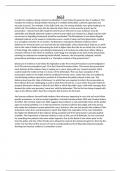Essay
criminology unit 3, Ac2.3 (A*)
- Module
- Crime Scene to Courtroom
- Institution
- WJEC
This is the example paragraph I used for my Criminology Unit 3, Ac2.3 section, in which I achieved 98/100 (A*). It perfectly matches the criteria and contains all the details/examples you need.
[Show more]



